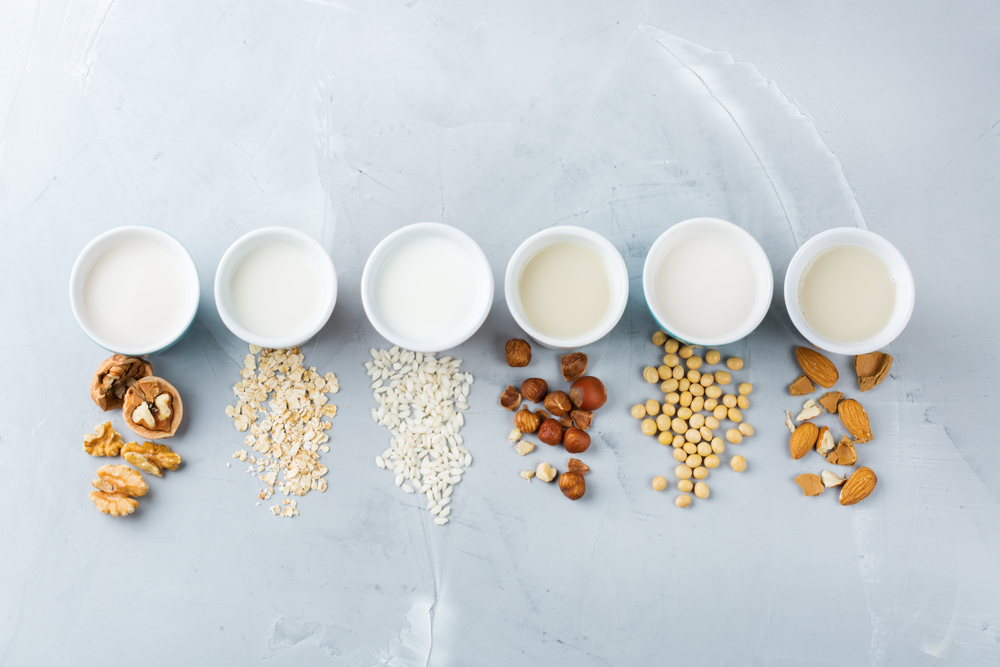What can you replace milk with? Plant-based drinks can be a notable alternative here. They are deliberately not called milk because the name was reserved for mammalian mammary gland secretions.
Why should we bother?
Vegetable drinks, such as almond, coconut or rice drinks, are recommended for people who cannot consume traditional milk due to allergies, lactose intolerance or a vegan diet. Due to their nutritional value, they often have an interesting taste, which can add variety to a traditional menu.
On the market, there are products made from cereals (e.g. rice, oats drink), legumes (soya drink), nuts and seeds (almond drink or pumpkin seeds) and tubers of underground plants.
Properties of plant-based drinks
Vegetable drinks have different nutritional values directly related to the raw material from which they are made. They are often enriched with vitamins or minerals (e.g. calcium). They differ in taste and - to some extent - in colour and consistency. They can be used to prepare dishes as a substitute for normal milk. They work very well as thirst-quenching drinks between meals.
Presented in the diet are the sources:
- good quality protein
- B vitamins (especially folic acid and vitamin B6)
- unsaturated fatty acids
- phytoestrogens
- potassium
- magnesium
- iron
- beta-glucan
The optimal way would be to prepare plant-based drinks at home. Those available in stores usually contain a large amount of sugar and taste enhancers.

Aloe vera - juice or drink?
Aloe vera is a plant whose healing properties have been known since ancient times. It is used both externally and internally. One of the most important parts of this plant is the flesh contained in the leaves consisting of 96% water. The remaining part is rich in amino acids, beta-carotene, vitamin C, B vitamins, minerals such as potassium, magnesium, calcium, phosphorus, zinc, sulfur, iron, glycosidic compounds, mucopolysaccharides, enzymes and antioxidants.
Aloe Vera juice is used as a medicinal product to prevent constipation (laxative effect), strengthen the immune system, help maintain the acid-base balance, detoxify the body of toxins and improve the functioning of the nervous system.
Kvass - a substitute for cola drinks?
Kvass is a beverage known for hundreds of years, obtained as a result of bread fermentation. It is a valuable source of probiotic bacteria beneficial for human intestinal flora. Healthy microflora is key to maintaining proper immunity, good mood and reducing the risk of many serious diseases including obesity.
In kvass, we can find B vitamins essential for the proper functioning of the nervous system, vitamin C and minerals such as zinc or selenium. Traditionally produced drink also contains some alcohol, so it is not recommended for pregnant women.
Birch sap - a treasury of electrolytes
Birch juice is obtained from the trunk of a tree, leaves or buds. Its healing properties have been used in folk medicine for hundreds of years. It is a treasury of nutrients, such as
- B vitamins, vitamin C, amino acids
- minerals - potassium, calcium, iron, copper, magnesium, antioxidants
- antioxidants
- salicylic acid derivatives.
It is used as an aid in the treatment and prevention of rheumatic problems, viral and bacterial infections, kidney stones, peptic ulcers and heart diseases. It has a slightly sweet taste. Due to the content of salicylic acid derivatives, it should not be given to children. Birch juice has a diuretic effect and facilitates detoxification (detox) of the body.






